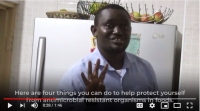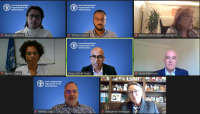News

27/01/2021
A virtual meeting of the Joint FAO/WHO Expert Meetings on Microbiological Risk Assessment (JEMRA) of Listeria monocytogenes in Ready-To-Eat (RTE) Food: Attribution, Characterization and Monitoring was held from 20 October to 6 November 2020. The purpose of the meeting was to review recent data on Listeria monocytogenes and determine the need to modify, update or develop new risk assessment models and tools for this pathogen.
Prior to the meeting, a public call for data and experts was issued. In addition, background documents were prepared ahead of time for consultation by the experts. The documents included:
A review of two...

15/01/2021
Two FAO and WHO directors briefed the Executive Committee of the Codex Alimentarius Commission (CCEXEC) yesterday on the UN Food Systems Summit, which UN Secretary-General António Guterres will convene later in 2021 to set about bold new actions that transform the way the world produces and consumes food. Jamie Morrison, FAO Director of the Food Systems and Food Safety Division and Lead on Knowledge and Policy for the Food Systems Summit Secretariat, and Francesco Branca, WHO Director of Nutrition and Food Safety, emphasized the important role food safety and Codex standards will have in the transformation process, and can benefit food...

16/12/2020
The 90th Joint FAO/WHO Expert Committee on Food Additives (JECFA) met from 26 October to 6 November 2020 to carry out risk assessments of trichothecenes (T-2 and HT-2) and discuss the acceptability of certain substances used as previous cargoes.
The meeting saw the participation of a number of prominent international scientists with a wide range of expertise. While initially slated to be held at the WHO headquarters in Geneva, the meeting instead took place on a virtual platform due to the various pandemic-related restrictions in place.
Trichothecenes are toxins produced by fungi that grow on many different grains like wheat, oats, and...

09/12/2020
A Joint FAO/WHO Expert Meeting was convened virtually on 30 March–3 April 2020 to provide risk assessments for tropane alkaloids, hyoscyamine and scopolamine. These occur in several plants that can contaminate staples like cereals and grains through the presence of toxic Datura stramonium seeds. Food aid contaminated with tropane alkaloids was determined to be the cause of food poisoning outbreaks in the Republic of Uganda and the Republic of South Sudan in 2019. These events affected more than 300 people and even resulted in deaths.
There are currently no international regulations in place for tropane alkaloids. With global distribution of...

09/12/2020
In October 2020, FAO released a guidance document to help decision-makers rank the public health risks posed by foodborne hazards and/or foods in their countries. The focus was on microbial and chemical hazards in foods but the approach explained in the guide could be used for any hazard. The guidance document walks readers through three iterative steps (defining the scope, developing the approach and conducting the risk ranking analysis and reporting results) to calculate the likelihood and severity of the adverse impact that foodborne hazards could have on the health of a target population.
We spoke with Dr Barbara Kowalcyk,...

04/12/2020
On 27 November 2020, FAO and WHO jointly led an online training session for Codex Members in Europe and Central Asia about making the best use of the FAO/WHO diagnostic tool for assessing status of National Codex Programmes.
The 1.5-hour session, conducted in English and Russian, guided the 23 participants through the tool functions and methodology, explaining that the tool aids countries to take stock of their national Codex programme and to assess what is working well and identify areas in need of improvement.
The tool can be used by Codex Contact Points and the competent authorities to assess:- the institutional...

24/11/2020
The rapid globalization of food production and trade is associated with increased potential for international incidents involving unsafe food. As a result, food safety issues occurring in one country may become a concern to other countries. While implementing effective prevention strategies throughout the entire food chain is the most effective way to produce safe food, it is impossible to eliminate all food safety risks.
Addressing incidents that result from contamination of food by

23/11/2020
FAO food safety expert Emmanuel Kabali describes what consumers can do to keep their food safe from microbes that are resistant to medicines like antimicrobials in this short video produced for World Antimicrobial Awareness Week (18-24 November 2020). As he prepares a meal for his family in Lusaka, Zambia, Kabali, who coordinates FAO’s AMR Project, demonstrates ‘the four Cs of food safety’. By cleaning, cooking, chilling, cross contamination – he explains – consumers can do their part to keep antimicrobials, such as antibiotics and antifungals, working.
Watch the video: https://youtu.be/Hl7iGCxaA3Q

23/11/2020
People from all over the globe tuned into an FAO-hosted webinar entitled “The impact of climate change on food safety” on 17 November 2020. In introducing FAO’s pioneering efforts to compile the scientific evidence showing that climate change is exacerbating food safety hazards, Jamie Morrison, FAO Director of the Food Systems and Food Safety Division, anticipated that the hazards considered are: foodborne pathogens and parasites, harmful algal blooms, pesticides, mycotoxins, and heavy metals.
Vittorio Fattori and Keya Mukherjee, FAO experts in food safety, summarized the key findings of the recent publication, Climate change: Unpacking the burden on food safety, which documents...

20/11/2020
This year the 7-day annual campaign previously known as World Antibiotic Awareness Week has undergone a change in name. World Antimicrobial Awareness Week (WAAW) is taking place on 18-24 November 2020 to promote the reduction of antimicrobial use so as to maintain their efficacy. Every year for the occasion, FAO, alongside the World Health Organization and World Organisation for Animal Health, leads a global information-sharing initiative.
We spoke with Jeffrey LeJeune, FAO Food Safety Officer, to better understand what is at stake and what we can do.
Let’s start with: Why did they change the name this year?
Many people are familiar with...
Stay up to date and connect to our RSS feed!
